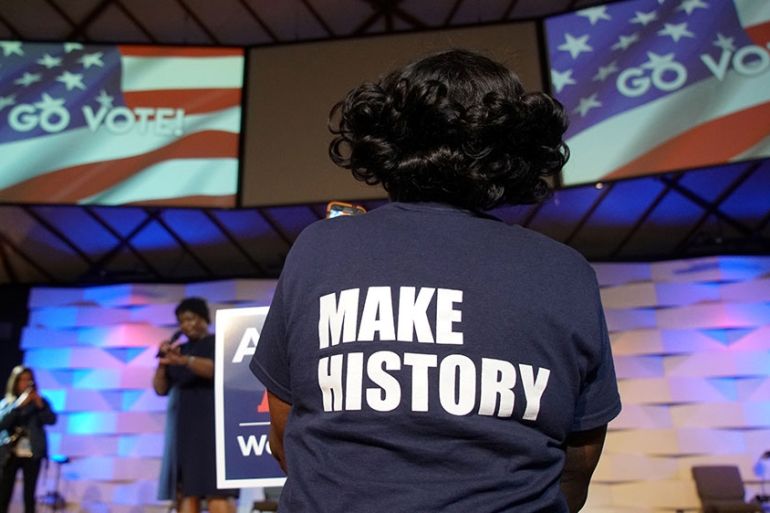In age of Trump, black women running for office in higher numbers
Hundreds of African American women are running for local and national office in the upcoming midterms.

Donald Trump‘s rise to power outraged Alabama resident Suzanna Coleman. When the Republican businessman and former reality television star won the November 2016 presidential elections, Coleman decided to take action.
Like many other African American women in the historically conservative state, Coleman, a lawyer and social worker, arrived at an epiphany: Why not run for office?
Keep reading
list of 4 itemsKey takeaways as ex-Trump lawyer Michael Cohen testifies in New York trial
Will Israel’s war on Gaza sway South Africa’s election?
Lithuania’s Nauseda wins first round of presidential election
With Alabama’s political representatives overwhelmingly white and male, the barriers were plenty. Women hold a mere 15 percent of the seats in the state House of Representatives, and African American women hold around half of those seats.
“For some reason, we don’t feel we should hold positions of power,” Coleman told Al Jazeera. “A lot of that changed. We had the same epiphany: Well, why not?”
Joining the ranks of African American women building momentum increasing their activism across Alabama for the last two years, Coleman became the Democratic candidate for the state’s district 15 in the upcoming midterm elections.
“We put ourselves out there, it was not an easy thing to do,” she said. “We just want to be looked at as citizens. We want a fair representation.”
Within days of Trump’s victory, nine African American women won judicial seats in Jefferson County, the southern state’s most populous county and home to Birmingham. Still, Coleman expected to be one of the few black women vying for office.
But outraged by Trump and inspired by the newly elected judges, more than 70 women of colour, most of them African American, launched their bids for local and federal office this year in Alabama. That number is far higher than in other states.
“We didn’t know back then what we were going to be facing,” Coleman said. “But this set the ground for other people that other women can do it as well.”
Nationally, more than 400 African American women ran in the primaries this year, according to an online crowdsourcing database.
Preserving civil rights gains
For many of those still in their respective races, the election is as much about preserving the legacy of the civil rights movement as it is about securing a seat at the table.
And in the age of Trump, Black Lives Matter, the #MeToo movement and a rightward shifting Supreme Court, African American women are also playing a crucial role in getting out to vote.
In December 2017, black women rallied behind Doug Jones, the Democrat who faced off against disgraced Republican candidate Roy Moore, who was accused by several women of sexual assault and harassment.
When Jones won and became the state’s first Democratic senator in 25 years, NBC exit polls found that 98 percent of female African American voters cast their ballot for him.
“Woman are stronger and bolder, now, to shed light on the hurt, this is the effect the Me Too movement had,” said Rhonda Briggins, an Alabama native and cofounder of VoteRunLead, an organisation dedicated to training women to run for office.
“With Brett Kavanaugh, his ruling opinions will set us back, not forward,” she told Al Jazeera. “Women have fought too hard. We are nowhere where we want to be on inequality, but now [this] is setting us back.”
As change touches her home state, Briggins is most excited about the judicial changes, describing the ascendancy of several black women to the judiciary as a “game changer for the country” that could lead to “the reform we need on the judicial side”.
But with a decline in the black voter turnout nationwide, activists have taken it up with themselves to encourage people to vote.
‘Democracy under attack’
Growing frustration has stemmed from a lack of representation, voter suppression and low enthusiasm for candidates, said LaTosha Brown, cofounder of the Black Voters Matter Fund.
“What we [were] hearing is that candidates don’t connect to people in everyday life, they do not engage with voters,” she said of previous years.
This year’s candidacy pool, however, has changed much of that. “[These] are not your traditional candidates, but southern candidates,” Brown told Al Jazeera.
One of those, she said, was Georgia’s Stacey Abrams, who could become the first black American female governor in the US.
“She has been openly progressive, not staying in the middle,” Brown said, celebrating Abrams’s outreach efforts in often overlooked parts of the state and alliance building with other minority groups.
“She is a black American woman, wearing natural hair. [She’s] not a traditional candidate.”
Hoping to drum up excitement, the Black Voters Matter Fund has sent its tour bus across the southern states, where activists hear voters’ complaints. Chief among them were fears that voter suppression could compromise the integrity of the elections.
“People are feeling democracy is under attack,” Brown concluded.
“Folks talking that American democracy is just a given, it never has been, and what you’re seeing now is the volatility of democracy. People are rising up to demand more of the system.”
For her part, Alabama state House hopeful Suzanne Coleman says every vote counts on November 6. “A lot of people think their vote doesn’t matter, when it absolutely does matter,” she said.
However the elections turn out, Coleman said, this year has reminded Americans they have the power to shape politics in the country.
“Regardless of how it turns out people have taken notice that this doesn’t have to be the way it is,” she concluded. “That’s what matters the most.”